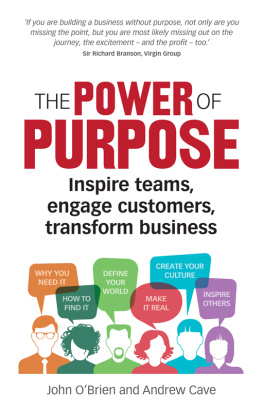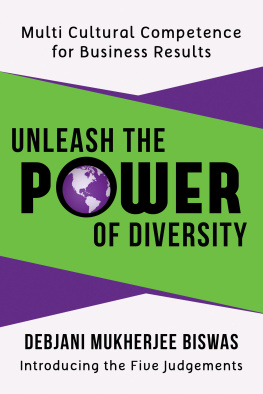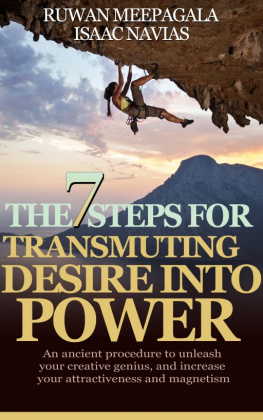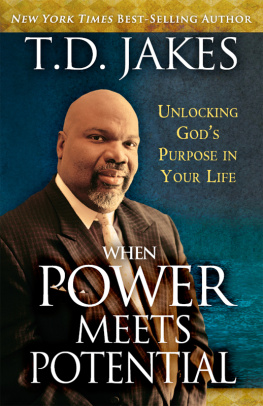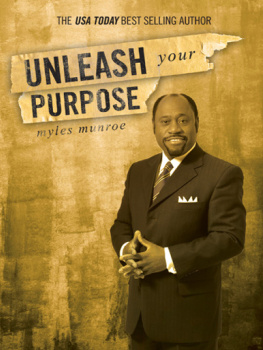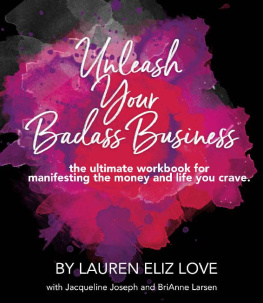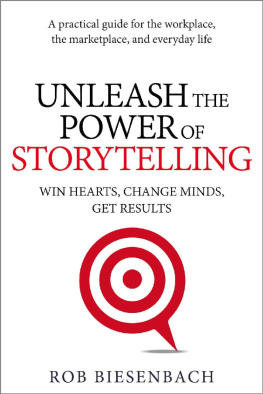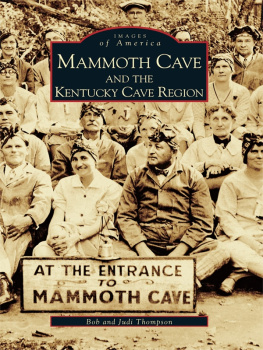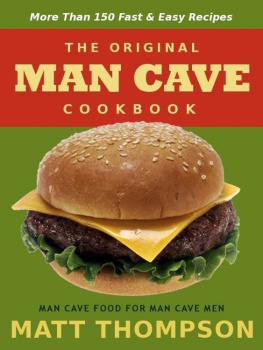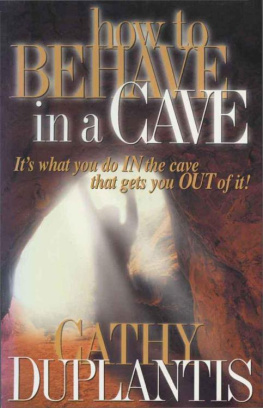Cave Andrew - The power of purpose : six steps to unleash the why of your business
Here you can read online Cave Andrew - The power of purpose : six steps to unleash the why of your business full text of the book (entire story) in english for free. Download pdf and epub, get meaning, cover and reviews about this ebook. year: 2017, publisher: Pearson Business, genre: Business. Description of the work, (preface) as well as reviews are available. Best literature library LitArk.com created for fans of good reading and offers a wide selection of genres:
Romance novel
Science fiction
Adventure
Detective
Science
History
Home and family
Prose
Art
Politics
Computer
Non-fiction
Religion
Business
Children
Humor
Choose a favorite category and find really read worthwhile books. Enjoy immersion in the world of imagination, feel the emotions of the characters or learn something new for yourself, make an fascinating discovery.
- Book:The power of purpose : six steps to unleash the why of your business
- Author:
- Publisher:Pearson Business
- Genre:
- Year:2017
- Rating:3 / 5
- Favourites:Add to favourites
- Your mark:
- 60
- 1
- 2
- 3
- 4
- 5
The power of purpose : six steps to unleash the why of your business: summary, description and annotation
We offer to read an annotation, description, summary or preface (depends on what the author of the book "The power of purpose : six steps to unleash the why of your business" wrote himself). If you haven't found the necessary information about the book — write in the comments, we will try to find it.
Cave Andrew: author's other books
Who wrote The power of purpose : six steps to unleash the why of your business? Find out the surname, the name of the author of the book and a list of all author's works by series.
The power of purpose : six steps to unleash the why of your business — read online for free the complete book (whole text) full work
Below is the text of the book, divided by pages. System saving the place of the last page read, allows you to conveniently read the book "The power of purpose : six steps to unleash the why of your business" online for free, without having to search again every time where you left off. Put a bookmark, and you can go to the page where you finished reading at any time.
Font size:
Interval:
Bookmark:

![]()
![]()
![]()
![]()
![]()
![]()
![]()
This book is dedicated
To Johns wife Elizabeth and daughter Katrina
in gratitude for the precious opportunity to find purpose in all I do.
And to Andrews parents Roy and Margaret for showing me the why in life.
For as long as I can remember, identifying and being driven by a clear sense of purpose in business has been extremely important to me.
When I was growing up in the Cheshire railway town of Crewe, my father ran a small grocery wholesale business, supplying small shops and pubs with biscuits, crisps and other confectionery products. He had previously run a shop himself so was all too familiar with the pressures facing such operations. He identified a gap in the market between large producers of biscuits, crisps and confectionery and small stores and pubs who couldnt afford to take the conventional minimum order size of several dozen cases.
A highly principled man and a lay-preacher on Sundays, he taught me three key lessons that formed beliefs I have held throughout my entire career and shaped my decade running Waitrose.
Firstly, he believed very strongly that in the eyes of God, everybody is equal and nobody is better than anybody else. Each person has unique skills and talents, so the task for leaders is to draw these out and make the most of them. He also taught me that we should give help to people where we are able to do so and that, though such acts had altruism at their core, such small acts of kindness can yield huge rewards in the long term.
One day as a teenager I went out delivering food with him and one of our stops was a tiny shop where the owner was just starting up and said he couldnt afford to buy much. My father offered to give him some cases and collect payment later but the shopkeeper said he didnt have enough even for a single case of 24, so my father offered to sell him just half a case, opening a box, taking out half the biscuits and putting them on the shelves.
When we got home, we realised we had given this grocer one packet short. My initial reaction was that it was a trivial oversight; it was late in the day and we should have dinner and go to bed. My father would have none of this however, insisting that agreement had been reached to supply 12 packets and that the extra packet could be significant to this fledgling business shop owner.
We made the round trip to rectify the situation and that commitment to our customer, that effort, was rewarded many times over the forthcoming years. From this tiny shop, the store owner expanded to become one of my fathers best customers.
The care and concern my father had shown him was hugely appreciated and he insisted on loyally sticking with my fathers business even when his grocery firm grew to become of sufficient size to be supplied directly by a major manufacturer.
I have remembered this throughout my business career and it influenced the Random Acts of Kindness initiative at Waitrose, through which we would do things that people didnt expect.
The initiative, which remains a valued part of Waitrose, was predicated partly on the benefits of making customers feel good about themselves. But there was also strong commercial logic that it should have a long-term benefit for the business. Thats exactly how this successful venture turned out. Like many of the ideas and initiatives pioneered in my career at the John Lewis Partnership, its gestation was from the purposeful seeds sown in my thinking by my father.
The John Lewis model is, of course, unique. The Partnership, made up of its people, is essentially managing owners, not employees and therefore the mindset is entirely different to a conventional operation. We didnt tell people what to do. We might ask them but more importantly we needed to engage them in what we needed to do. We needed to ensure everyone understood the purpose of the business and their role within it.
Treating people with respect and everyone being equally important were not only the right things to do but were also good for business, whether the people concerned were on the shop floor or in the boardroom. This also related to our suppliers, customers and the wider communities within which we operated and without which we could not prosper.
My firm belief is that one can have the best strategy in the world, make great decisions about new products and correctly gauge the appetite for new retail space in attractive locations. However, none of those will bear fruit if the cashiers, for example, arent striking the right tone with customers. It is so easy to lose business like that. So what really matters is how every individual comes to feel key in the business and very much part of the journey.
All of my time in the Partnership was about making people feel that what they did was worthwhile and developing their skills, aptitudes and experience so that together we did a great job commercially. We invested in equal measure in the relationships with our suppliers and then ensured our customers felt good through charitable initiatives and random acts of kindness.
Thats what clarity of purpose in business means for me. It is driven by relationships with people, be they employees, customers or people in our supply chain. It harks back to what I learned from my father and together such relationships form the basis of good business in all its forms.
This is fundamentally about creating a purposeful culture, based on strong ethical values and a sound commercial offering. Under the right leadership, these combine to allow people to understand what you are setting out to achieve. This has never been more important for businesses generally and society at large at a time when the entire capitalist system is coming under pressure.
People now are trying to find a different and better way of doing good business. If your business has clarity of purpose, based on sound ethical principles, and its leaders and individuals also have clear senses of their own purpose and role, the business will function better and be more resilient to the inevitable forces of the market. It will also be better at attracting top talent, growing customer loyalty and building long-term sustainable success.
There are now a growing set of business models vying for attention in this space. There is also a wider debate about the role of business in society generally, which John and Andrew do not seek to add to here. Instead, based on their collective half century in this arena, working with, advising, observing and commentating on business, this useful and accessible guide outlines how organisations can find, express and benefit from a clear sense of purpose.
How this can be applied, what it means and how it will affect your business, leadership, employees and customer engagement will be different for each business. By providing simple steps to follow and inspiring contributions from a wide range of purposeful leaders, this book allows and encourages readers to think differently about their business approach and role.
Font size:
Interval:
Bookmark:
Similar books «The power of purpose : six steps to unleash the why of your business»
Look at similar books to The power of purpose : six steps to unleash the why of your business. We have selected literature similar in name and meaning in the hope of providing readers with more options to find new, interesting, not yet read works.
Discussion, reviews of the book The power of purpose : six steps to unleash the why of your business and just readers' own opinions. Leave your comments, write what you think about the work, its meaning or the main characters. Specify what exactly you liked and what you didn't like, and why you think so.

